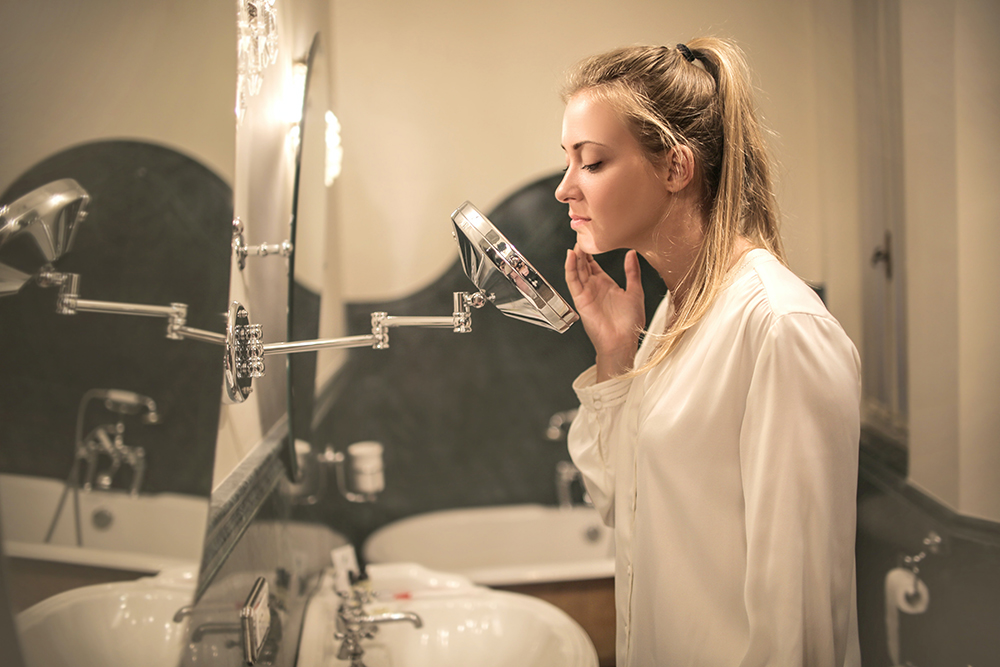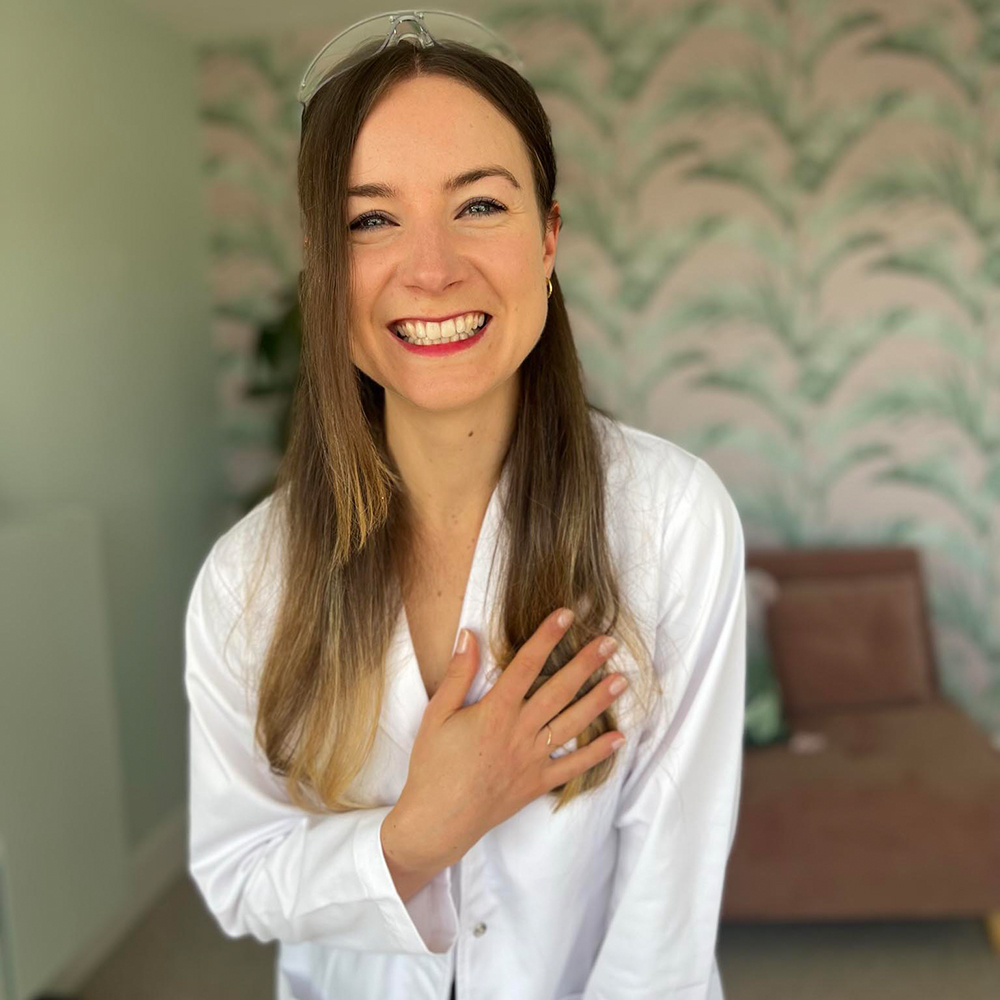Last Updated on 6th July 2023 by Sarah Sarsby

Cheryl Woodman is a scientist specialised in acne. She also runs the fabulous blog Honesty for Your Skin. Here, she answers your top 5 acne FAQs, so you know how best to treat your skin.

Can I use makeup if I have acne?
I love this question because most women are surprised by my answer. In my scientific opinion and years of experience working with women who are struggling with acne, the right makeup can actually help you get rid of breakouts faster. But the important part is that this needs to be the right makeup.
The wrong makeup, just like the wrong skincare, can definitely aggravate existing acne and also be the sole cause of new breakouts.
That’s because certain kinds of makeup (comedogenic makeup and makeup using certain oils) can block pores and fuel your skin’s growth of acne bacteria. In cosmetic science, we call this kind of acne acne cosmetica – meaning a kind of acne that’s caused by cosmetics.
However, the exciting bit is the right makeup can actually help heal your skin from acne. It works because when you have acne and breakouts something called your skin barrier is poorly.
Your skin barrier works like a shield to keep bacteria out of your pores. When your skin barrier is poorly, the wrong bacteria start overgrowing and initial acne infections become swollen with secondary infections. This looks like cystic acne or red and swollen whiteheads.
Makeup can help prevent swollen, angry acne because makeup is designed to stay on the very top layers of your skin. And as a happy consequence, this now means your skin has an extra temporary shield. A breathable barrier. A protector.
This shield is not pore-blocking if it’s staying in the top layers of your skin.
Why does my acne get worse before my period?
The biggest cause of pre-period acne is the humungous drop in estrogen, which begins 7 days before you bleed.
Estrogen is such a yummy hormone for your skin. Not only does it help your skin resist wrinkles and fine lines, help plump your skin, and help hydrate your skin, but it also counteracts the impact of androgens on your skin. These androgen hormones are the most common cause of breakouts.
Estrogen sits on the other side of your hormonal see-saw. However, when estrogen hormones go MIA 7 days before your period, the impact of androgens like testosterone is amplified.
This is the most commonly known cause of period acne.
What most women don’t know is you can easily prevent pre-period breakouts – you really can. The simplest and most impactful way is by making key changes to your diet. It works because of this big fact; certain foods you eat tell your ovaries to make more androgens.
This can be heightening androgen levels just before you get your period meaning your acne’s getting significantly worse just before your period.
If you want to go deeper into how to prevent pre-period acne with the right foods, I give a step-by-step guide to a science-proven acne diet inside my online acne healing course, Acne Warrior.
Does diet affect acne?
Oh heck yes, it does. Certain types of food for many women are a big trigger for acne because some foods tell your skin’s oil-making cells to grow.
Having oily skin makes your skin prone to acne because acne bacteria thrive in oil-filled pores.
It’s why ‘drying’ skincare can temporarily help you get rid of acne… but don’t use it. Drying skincare wrecks your skin’s long term health.
What I’m about to show you is a microscopic image of sebum-making cells. In this photo they’re stained red:
Do you see how in photo B the red cells are bulging, exploding, and growing?
The big difference between these photos is cells in photo B have been hyperstimulated by a hormone some foods cause your body to release bucket loads of. This is a big trigger for acne breakouts.
To be clear, this isn’t about avoiding certain foods but eating in a way that quietens this acne hormone in your body. I have a free acne diet cheatsheet you can download here that is going to help get your sebum glands looking like photo A and therefore help calm and reduce your acne flares.
I only get acne on my chin, what does this mean?
As scientists, we know breakouts around the lower third of the face are hormonally driven. Breakouts here are a strong sign that you have hormonal acne.
I actually hate this diagnosis because for many women it feels like hormones are something they have no control over and therefore they’re going to be stuck with breakouts forever. It’s a horrible feeling.
It can also feel hopeless because hormone testing often shows your hormones are ‘in range’. It’s very common to have in-range hormones and still be experiencing hormonal acne.
This Instagram post of mine below explains more:
The great news is daily hormone patterns can be changed greatly by diet and also by supplements. But supplements are very much the cherry on top, they should never be the key intervention for healing acne.
Does sweat cause acne?
I know first-hand when you have acne it can feel like everything is a potential trigger, especially when you go down the Google rabbit hole. But the exciting fact is not only can sweat help moisturise your skin, but it also looks like sweat has the ability to save your skin from bacterial infections.
And acne at its heart is a bacterial infection of your pores.
In 2001 scientists discovered human sweat contains an extremely effective antimicrobial peptide, which they named Dermcidin. They found it to be incredibly effective against staphylococcus aureus infections. We know that about 43% of acne patients also have staphylococcus aureus infections, which makes acne inflamed, red, hot, and cystic – so sweating it out at the gym could actually help prevent breakouts.


It’s great to read this from someone who really knows the science! I have often wondered what spots on my chin mean specifically, so this has cleared that up for me.
What brand of concealer and foundation should I use? I use cos dna but not one type is 100% good for you skin?
This blog is a game-changer! As someone who’s battled acne, I’ve never had my burning questions answered with such clarity and scientific backing. It’s like having a trusted expert in your pocket. From causes to treatments, it’s a must-read for anyone seeking an effective acne solution. Thank you!